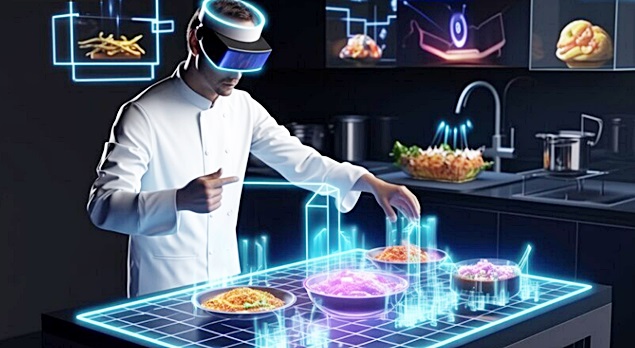1218

Tariff Uncertainty Drives Food and Beverage Companies to Accelerate AI Adoption Source: FoodNavigator
Global Confusion
Delays, implementations, and suspensions of U.S. government trade tariffs have sparked global confusion and pushed the food and beverage industry into crisis management mode.
"The uncertainty surrounding President Trump’s tariffs, combined with the ongoing labor shortage, is creating significant pressure on food and beverage businesses," says Georgie Thomas, managing director at food and beverage platform Choco.
On top of that, producers are facing rising production costs and increasing commodity prices, resulting in increasingly tight margins.
For wholesalers and distributors, tariffs on imported goods will raise costs for internationally sourced products such as fruits, vegetables, and beverages. These higher costs will squeeze profit margins and could lead to increased prices for consumers.
This is especially true for small and medium-sized enterprises, which lack the purchasing power of larger operations. Distributors are also experiencing supply chain disruptions, as changes in import prices and commodity availability lead to inventory challenges, delivery delays, and stock shortages.
Manufacturers may also feel the impact of Trump’s tariffs from the consumer side. As food prices rise, consumers are likely to cut back spending—particularly in price-sensitive categories like alcoholic beverages, premium foods, sweets, and snacks.
All of this, Thomas notes, is pushing companies to increasingly turn to artificial intelligence (AI) as a solution to streamline operations and maintain profitability.
Trump’s Tariffs Raise Prices and Disrupt Supply Chains (Image: Getty / Best Photo for All)
Is the F&B Sector Rushing to Embrace AI?
AI offers a critical advantage in today’s economic climate by enabling businesses to automate tasks that don’t require human intervention.
"By shifting these repetitive processes to AI, companies can free up employees to focus on more impactful work, such as building customer relationships and driving sales," Thomas explains.
This transition is particularly important as businesses face rising costs due to tariffs and continued labor shortages in the food and beverage segment.
AI Costs on the Rise
While AI adoption is expected to grow under Trump—even amid interruptions—tariffs are likely to make the technology more expensive. This is because the cost of AI-based technologies, such as server parts and data centers from supplier countries including Taiwan (32%) and South Korea (25%), is set to increase.
Still, even this won’t slow AI adoption, says Jason Snyder, chief technology officer at Momentum Worldwide.
“They’ll just fight harder. Scarcity drives adoption, and AI will feel more inevitable than ever,” he states. “The irony is that the infrastructure is more expensive, but tariffs validate the value of AI. If companies are willing to pay more to access computing and GPUs, that means AI is essential, not optional.”
AI Is Already Transforming Food and Beverage
Although still in its early stages, AI has already had a dramatic impact on the food and beverage industry. It is accelerating scientific research, designing new products and branding, optimizing inventory management, and supporting regenerative agriculture through green technology advancements. It also enhances the consumer experience with features like product recommendations.
AI tools are improving forecast accuracy, allowing companies to better predict demand, optimize supply chains, and manage inventory—crucial at a time when tariff turbulence raises global supply chain concerns.
This also helps reduce food waste, saving money and supporting sustainability.
AI further promotes food safety by enhancing contamination detection, ensuring product consistency, and optimizing shelf life—another essential benefit as the tariff crisis threatens global trade and supply networks.
The Future of AI in Food and Beverage
AI’s potential to revolutionize the food and beverage industry is virtually unlimited. According to Thomas at Choco, its greatest promise lies in automated food preparation, advanced consumer insights, and the rise of AI agents.
AI also has the ability to extract deeper consumer insights by analyzing large volumes of data on preferences and behaviors.
"This will allow food and beverage companies to personalize experiences even further—whether through tailored recommendations, targeted marketing, or new product development based on emerging trends," says Thomas.
Additionally, he predicts that AI agents—autonomous systems capable of executing tasks and making decisions—will begin to take on more responsibilities within food and beverage operations.





